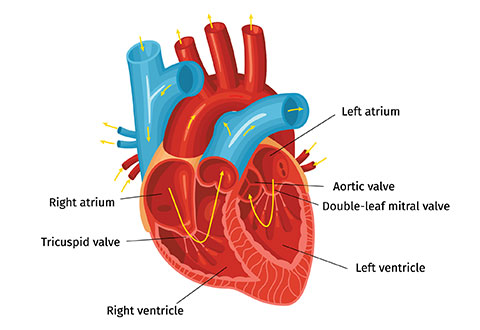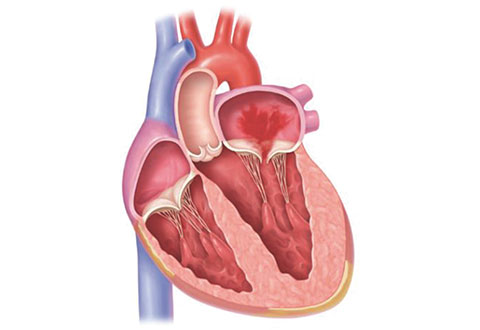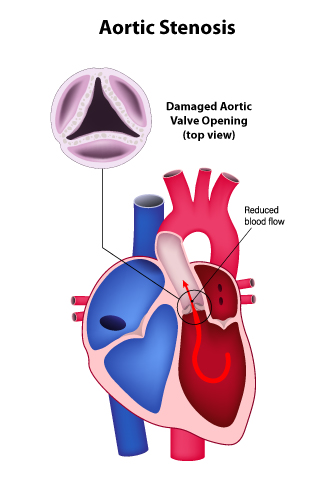While most heart murmurs are innocent and pose no significant health risks, there are situations where heart murmurs may be considered potentially dangerous. Learn more from National Heart Centre Singapore (NHCS) Murmurs article.
Murmurs are abnormal sounds that are heard on physical examination of the heart. While heart murmurs are often harmless, some cases may indicate underlying heart conditions that need medical attention.
By Dr
Cai Xinzhe James, Associate Consultant, Department of Cardiology
A heart murmur is a term that is used by many but perhaps not very well understood. While most heart murmurs are innocent and pose no significant health risks, there are situations where heart murmurs may be considered potentially dangerous. Understanding the nature of heart murmurs and knowing when they are abnormal can help in timely diagnosis and appropriate treatment.
What causes heart murmurs?
The human heart is a remarkable organ responsible for pumping oxygen-rich blood throughout the body, ensuring the proper functioning of various vital organs. In a healthy heart, blood flows smoothly and silently in the heart through the chambers, valves and blood vessels, with the usual heart sounds made by the usual closure of the heart valves. However, sometimes heart murmurs can occur. In medicine, a murmur is used to describe a physical finding of additional heart sounds caused by turbulent blood flow in the heart. It can come in various pitches and durations - low pitch, high pitch, continuous or short in duration. The vast majority of murmurs are due to diseases of the heart valves – either narrow (stenotic) or leaky (regurgitant) heart valves, or other structural heart conditions. In the case of healthy heart valves, our heart has four valves that ensure the one-way flow of blood through the chambers. When these valves are damaged or do not function properly, it can lead to turbulence in the blood flow, resulting in additional rumbling sounds being created, therefore causing the “murmur”.

Normal blood flow in a healthy heart – one-way flow of blood through the chambers.
How are murmurs picked up?
Murmurs can be generally picked up through physical examination of the chest with a stethoscope. Depending on the location, pitch, as well as duration of the murmur, different diagnoses can be considered. Further referral for a transthoracic echocardiogram by the cardiologist may be required. Transthoracic echocardiogram is an ultrasound of the heart, used to evaluate the heart for structural problems. An echocardiogram will be able to assess the valves of the heart with Doppler signals (sound waves showing blood moving through the blood vessels) to detect any narrow or leaky heart valves.
What are some complications of murmurs?
Common valvular heart diseases that cause murmurs include mitral regurgitation and aortic stenosis.
Mitral regurgitation is a common cause of murmurs in patients and is a condition where the mitral valve is leaky and resulting in blood flowing backwards from the left ventricle to left atrium. It can cause breathlessness if the amount of leakiness of the mitral is severe, however, it is common for patients to be asymptomatic without the need for any treatment. For those who are symptomatic, the treatment options available include open-heart surgery to repair or replace the heart valve (Mitral Valve Repair or Replacement), or in special circumstances, minimally invasive procedures such as Transcatheter Edge-to-Edge Repair to treat leakage of the mitral valve.

Mitral regurgitation is a condition where the mitral valve becomes leaky and blood flows backward into the left atrium. Illustration courtesy of Abbott Structural Heart.
Aortic stenosis is another common cause of murmurs in the elderly, which is commonly caused by the degeneration of the aortic valve. In such a condition, the aortic valve is narrow and makes it difficult for blood to pass through. Just like mitral regurgitation, aortic stenosis can cause patients to become breathless, have chest pain or faint. When symptoms developed due to severe narrowing of the aortic valve, treatment interventions can be performed. These include aortic valve surgery to replace the valve (Aortic Valve Replacement), and minimally invasive procedures (key-hole techniques) such as Transcatheter Aortic Valve Replacement to replace a narrowed aortic valve that fails to open properly.

Aortic stenosis is a condition where the aortic valve becomes narrow and blood flow is disrupted.
However, not all murmurs are due to disease. There are some murmurs that can be due to benign conditions such as in young individuals with a dynamic circulation where blood flow is fast and causes a murmur even if the heart valves are normal. This also occurs commonly in pregnant ladies who tend to have a higher amount of blood flow during pregnancy. In some patients, a murmur can be due to congenital heart conditions such as holes in the heart or other abnormal cardiac conditions.
There are many possible causes of heart murmurs. Murmurs that are particularly loud or intense may indicate a significant underlying problem. A murmur that persists beyond childhood or undergoes a change in intensity or pitch may also suggest an underlying heart abnormality or disease. If a heart murmur is accompanied by symptoms of chest pain, shortness of breath, fatigue, dizziness, fainting, or swelling in the legs, these can be warning signs of a more serious heart condition and there is a need for immediate medical attention. Do always seek the opinion of a trusted doctor for a proper diagnosis and treatment.
This article is from Murmurs Issue 45. Click here to read other articles or issues.
